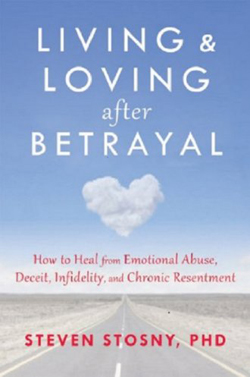Webinar Course
There’s an implicit promise in the formation of emotional bonds, that your loved one will:
Care about your well-being
&
Never hurt you intentionally.
When the promise is broken, we suffer profound betrayal.
This Webinar course will help overcome the effects of:
Infidelity
Deceit
Financial manipulation
Chronic resentment or anger
Abuse
You’ll regain trust in yourself…
To heal, grow, and love again.
Recorded Webinars and texts:
Intimate Betrayal
Use Pain for Growth
Develop a Healing Identity
Heal Painful Memories
Freedom from Resentment
Use Doubt Therapeutically
Time Dimensions of Repair
Wise Trust
Know What You Want
Compassionate Repair
Exercises
Intimate betrayal is a pain unlike any other, striking at the core of our capacity to trust and love. This extraordinarily harsh and lingering pain almost invariably overflows into other areas of life. Work efficiency plummets for most who suffer its sting.
Some feel unable to resume their normal level of caring behavior in any relationship, including those with friends, parents, and children.
Many are left feeling unworthy of love.
Most endure long periods of dull ache or depressed mood, punctuated by torrents of anger, shame, guilt, anxiety, resentment, and grief.
Intimate betrayal upends your life in one of two ways: by sudden revelation or gradual realization.
With deceit, embezzlement, and infidelity, you discover that your partner has lied, manipulated, stole, or cheated.
You may have guessed that something was amiss, but no amount of suspicion could mitigate the shock and hurt when struck by your partner’s confession, an eye witness account, uncovered emails/texts/phone messages or other incontrovertible evidence.
You became aware in an instant that your life would never be the same.
Some faces of intimate betrayal, such as abuse or being forced to walk on eggshells to appease a partner who is chronically resentful, angry, critical, stonewalling, or self-obsessed. You may have tried for a long time to make the best of your partner’s bad behavior – overlooked it, made excuses for it, or simply refused to identify it. Your instinct to adapt, cooperate, and trust would have benefited most relationships. Yet your noble efforts to preserve emotional bonds with your partner (and protect your children, if you have them) may have delayed recognition of the betrayal you have suffered.
The Floor of Security Crumbles after Betrayal
Whether it crashes upon you in revelation or seeps into consciousness via delayed realization, intimate betrayal snatches the floor of personal security from under you. Most of my clients describe the initial aftermath of revelation and realization as a kind of freefall, with no bottom in sight. Shock and disbelief are punctuated by waves of cruel self-doubt:
Was I attractive enough, smart enough, successful enough, interesting enough, present, attentive, caring, patient, or sacrificing enough?
The New Floor: Anger
Shock, disbelief, and self-doubt may have given way to intense anger that seems to course through your veins whenever you think of the betrayal, and you probably think of it often. The frightening uncertainty and utter powerlessness of the free-fall condition is why betrayal of any kind stimulates the most virulent form of anger. Betrayal and anger are typically inseparable, for a while. The reasons owe more to biology than psychology.
A survival emotion common to all mammals, anger has potent analgesic and amphetamine components – they temporarily numb pain and provide a surge of energy to overcome perceived threat. These empower animals to flee when vulnerable to threat or to fight when flight is not possible. This is why the weakened tend to be skittish and the wounded become ferocious.
The same protective mechanism common to all mammals is activated by intimate betrayal. The surge of energy and pain-numbing qualities of anger temporarily ease powerlessness, self-doubt, and vulnerability.
Dr. Stosny’s Blog on Psychology Today.
